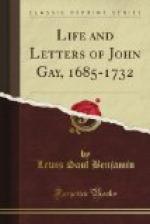But I, who ne’er was bless’d
by Fortune’s hand,
Nor brighten’d plough-shares in
paternal land.
Long in the noisy town have been immured,
Respired its smoke, and all its cares
endured.
Where news and politics divide mankind,
And schemes of state involve th’
uneasy mind.[4]
Gay was then, as ever, a great eater. “As the French philosopher used to prove his existence by cogito, ergo sum,” Congreve wrote to Pope long after, “the greatest proof of Gay’s existence is edit, ergo est."[5] He ate in excess always, and not infrequently drank too much, and for exercise had no liking, though he was not averse from a ramble around London streets. As the years passed, he became fat, but found comfort in the fact that some of his intimates were yet more corpulent. To this, he made humorous reference in “Mr. Pope’s Welcome from Greece":—
And wondering Maine so fat, with laughing
eyes,
(Gay, Maine and Cheney,[6] boon companions
dear,
Gay fat, Maine fatter, and Cheney huge
of size).
Gay had a passion for finery. To this foible Pope, in the early days of his acquaintance with the young man, made reference in a letter to Swift, December 8th, 1713: “One Mr. Gay, an unhappy youth, who writes pastorals during the time of Divine Service, whose case is the more deplorable, as he hath miserably lavished away all that silver he should have reserved for his soul’s health, in buttons and loops for his coat.” Gay was not only well aware of this weakness, but he deplored it, though he could never contrive to overcome it. He made allusion to it in some lines known as the “Epigrammatical Petition,” addressed to Lord Oxford,[7] in June, 1714, and also in the prologue to “The Shepherd’s Week":—
I sold my sheep and lambkins too,
For silver loops and
garments blue:
My boxen hautboy sweet of sound,
For lace that edged
mine hat around;
For Lightfoot and my scrip I got
A gorgeous sword, and
eke a knot.
Gay now renewed his acquaintance with his old schoolfellow, Aaron Hill, who, it is said, though on doubtful authority, employed him as an amanuensis when setting on foot the project of answering questions in a paper, styled the British Apollo, or, Curious Amusements for the Ingenious.[8] The first number of this publication appeared on March 13th, 1708, and it was issued on Wednesdays and Fridays until March 16th, 1711. Gay referred to it in his pamphlet, “The Present State of Wit,” published in May 1711: “Upon a review of my letter, I find I have quite forgotten the British Apollo, which might possibly have happened from its having of late retreated out of this end of the town into the country, where I am informed, however, that it still recommends itself by deciding wagers at cards and giving good advice to shopkeepers and their apprentices.” Whether or no Gay ever contributed to the British Apollo, it seems likely that it was through the good offices of Hill that in May, 1708, Gay’s poem, “Wine,” was published by William Keble at the Black-Spread-eagle in Westminster Hall, who, about the same time, brought out a translation by Nahum Tate, the Poet Laureate, and Hill, of a portion of the thirteenth book of Ovid’s “Metamorphoses.”




